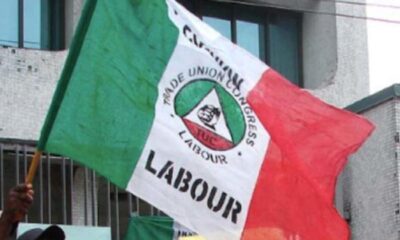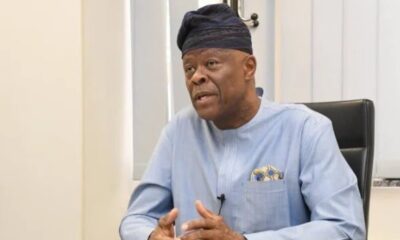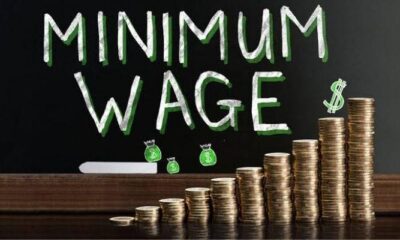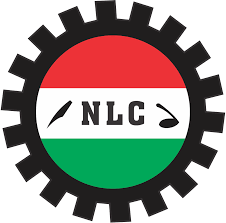Top Story
FG eyes $1.5bn World Bank loan to finance budget deficit
…As Minister pledges to respect CBN autonomy, Ways & Means borrowing limit
The Federal Government of Nigeria is eyeing a $1.5billion World Bank loan to finance the country’s budget.
This follows the falling oil prices and shortfall of production projected by the 2023 budget leaving over N12 trillion deficit needed to finance the budget.
Nigeria has a benchmark oil production of 1.69 million bpd for the year, Nigeria has not been to hit that target between January and September.
Recently, oil production on a daily basis hit 1.346 million barrels in September according to
data from the Nigerian Upstream Petroleum Regulatory Commission (NUPRC).
The latest figure signifies a 14 percent compared to 1.181 million barrels produced in August.
While briefing the press on highlights of Nigeria’s participation in the just concluded annual meeting of the World Bank/International Monetary Fund, IMF, in Marrakesh, Morocco, Minister of Finance and Coordinating Minister of the Economy, Mr. Wale Edun said that Nigeria has now become first consideration for foreign investment following the positive response to the reforms measures introduced by the Federal Government.
The Minister said, Nigeria is now at the forefront of consideration for foreign investment among the international community.
He said, “There have been many conversations and as I said earlier, the narrative is that with the bold courageous steps that Nigeria has taken, the narrative is that we are now at the forefront, almost number one on people’s list when they want to look at where to invest. That is the narratives and I am sure if you have been around through this week, you would have picked it up.
“There is more to be done but Nigeria is definitely on the right path, that we have taken the right decision for the economy to recover and for it to attract foreign direct investment and as well I will add domestic investment in order to recover full economic growth, job creation and at the same time achieve inclusivity of women and young people.
“That is the opportunity we have had, not so much to stand in front of people and showcase but that they get the opportunity within this environment to understand even more clearly what has been done.”
Edun also disclosed that the World Bank will soon release a $1.5 billion loan to Nigeria, which had been in the pipeline for a while adding that given the prevailing high interest rate regime across the world, the FG will focus on initiatives for financing on reasonable terms.
He said, “On the talks with the World Bank on $1.5 billion budget support, that is correct. The World Bank is the number one multilateral development bank helping developing countries or funding developing countries, projects and programmes, and sectors.
“It has free money through either International Development Association (IDA). It is for the poorer countries and right now I think we qualify as one of the countries that can borrow in the normal window of World Bank funding but also some concessionary IDA funding and that means that effectively the interest rate will be zero.
“So, therefore, there is no stigma attached to qualifying for World Bank funding to help finance development. In this particular case, it has long been in the pipeline, and we are hoping that funding will come through soon. A lot of hard work is being done. There is a Federal Executive Council meeting on Monday, that should be able to discuss this, as well as other initiatives for financing on reasonable terms. We have talked about the high costs of money, the World Bank money is the cheapest.”
Edun said that notwithstanding the commendations for the reforms, the FG is aware of the painful impact of the reforms on Nigerians, assuring that given the various interventions rolled out in recent times, things should improve day by day.
He said: “These are painful reforms and Mr. President is a man of empathy who promised not to leave the vulnerable and poor behind. And as you know there is a set of interventions being rolled out which day by day should improve things.
“More food has been grown, fertilizers are being released, CNG transport is the order of the day, while the government pauses, conversion kits are on the way, there is take up of that initiative by the private sector.
“So day by day we are moving closer to affordable and even cleaner energy simply because the price of petroleum products has been put where it really stands rather than having cheap fuel which is below the market price and below it’s value. Now you are seeing the right value and that is making the move to cleaner and finer energy.
“I will also add, one of the benefits, when we talk about the benefits coming through some of the measures taken, the fact that there has been a 30 per cent reduction in smuggling of petroleum products across the border, I think is a major achievement of that all important step to remove fuel subsidy.”
Responding to the call by IMF for coordination of monetary and fiscal policy, and the need to balance monetary tightening with fiscal tightened, the Minister said that in view of the commitment of President Tinubu to the rule of law, such coordination will be done based on respect for the autonomy of the CBN as well as respect for the statutory limit on Ways and Means borrowing.
Edun said, “I think that there will be the coordination that is required. However, Mr. President is a man who keeps his word. And one of his priorities is the rule of law and as such, he will keep to the letter and the spirit and the autonomy of the central bank. So it’s within that constraint that the coordination will take place.
“Regarding Ways and Means, President Bola Ahmed Tinubu had even while campaigning as a candidate, President-elect and President has a commitment not to go beyond the statutory limits.”
“One of his priorities is rule of law, sticking to agreements, sticking to law. And so, his commitment is to come within the limit for Ways and Means which essentially means overdraft borrowing from the central bank.
“However, having made that commitment and given that direction of travel, I think the idea and commitment is to come within whatever is the statutory limit as soon as possible. But definitely, we have begun that journey back from the situation of ballooning or seemingly out of control borrowing from the central bank.”
The Minister further disclosed that the FG will deliver this month the Medium Term Expenditure Framework, MTEF, adding that the budget 2024 will be based on an appropriate crude oil price benchmark.
He said, “Regarding the oil benchmark for the budget, there is the Honourable Minister for Budget and Planning, I am sure he is much better placed to answer but as the Coordinating Minister of the Economy, I do have some insight on that. And I will say that I am sure we will come up with a really appropriate oil benchmark and as for the medium-term, economic framework, yes, it will be delivered by this October.”
Top Story
Account enrollment: Court validates CBN’s regulation, permits collection of customers’ social media handles


…Dismisses concerns, says social media handles not protected by privacy rights
…Financial institutions cleared to collect social media handles for KYC
By Sodiq Adelakun
The Federal High Court in Lagos has ruled in favour of the Central Bank of Nigeria (CBN) in a case challenging the regulation that requires financial institutions to collect their customers’ social media handles as part of the Know-Your-Customer (KYC) procedure.
Recall that the Socio-Economic Rights and Accountability Project (SERAP) had urged the court to compel CBN to withdraw its directive to banks and other financial institutions.
However, in the ruling, Justice Nnamdi Dimgba struck out the suit filed by Lagos-based lawyer, Chris Eke, who argued that the regulation violates the right to privacy of bank customers.
Eke had sought a declaration that the regulation contained in Section 6(a) (iv) of the Central Bank of Nigeria (Customer Due Diligence) Regulations, 2023, is undemocratic, unconstitutional, null, and void, as it contradicts Section 37 of the 1999 Constitution of the Federal Republic of Nigeria (as amended). However, Justice Dimgba ruled that the regulation does not breach the right to privacy of bank customers.
The CBN regulation is targeted to enhance customer due diligence and anti-money laundering measures, and requires banks to collect social media handles, among other personal information, from their customers.
The applicant had asked the court to grant an order of perpetual injunction, restraining CB from enforcing the regulation which requires financial institutions to request customers’ social media handles as part of normal bank customer due diligence requirements.
The CBN in its response to the suit, filed a notice of preliminary objection, challenging the competence of the suit. The apex bank also disagreed that the said regulation constitutes any interference with the private life of the applicant, as claimed.
The judgment came as Justice Dimgba dismissed a suit, stating that the notice of preliminary objection held merit and consequently struck out the case.
During the proceedings, Justice Dimgba emphasised that providing a social media handle is akin to furnishing email addresses, phone numbers, and other contact details for banking purposes.
He argued that such information aids in conducting due diligence to ascertain if an individual is suitable for conducting business with a bank.
Justice Dimgba further explained that the essence of having a social media account implies a willingness to engage in public communication, thus rendering privacy concerns unfounded.
According to him, “First, the Applicant claims that the requirements on the CBN Regulations for financial institutions to request and collect the social media handle of its customers as part of KYC infringes on his right to privacy.”
“This claim is very ambitious and amounts to a very far throw. The said Regulations are directed to and apply to financial institutions. It does not apply to private individuals such as the Applicant.
“Even if, as appears to be argued, that the Regulations itself would inevitably affect the Applicant, this claim is speculative for the simple reason that in nowhere in the affidavit in support was it stated that the Applicant operates an account with a financial institution and that the said institution had demanded his social media handle. So the suggestion that he would be affected by this Regulation, albeit negatively, is very speculative and at large.
“Secondly, there is also no deposition to the effect that any financial institution had begun to implement this Regulation and that its implementation had begun to create disruptions and inconvenience against the general population, in which case one could infer that the suit should be legitimated as a public interest litigation.
“Thirdly, assuming even that the banks had begun to implement these regulations, the applicant assuming he maintained any bank accounts or sought to open one, but is being hindered or irritated by the requirement of the Regulation to avail his social media handle as part of KYC, the Applicant still had a choice, which is to refuse to do business with any bank insisting on the information as part of its social media handle, but to seek other alternatives.
“Fourthly, and for all it is worth, I do not see how asking a banking or potential banking customer to provide his social media handle can ever amount to a breach of privacy.
“Granted that Section 37 of the Constitution of the Federal Republic of Nigeria 1999 (as amended) provides inter alia: The privacy of citizens, their homes, correspondence, telephone conversations and telegraphic communications is hereby guaranteed and protected.
“My view is that the provision of a social media handle is of the same genre as the provision of email address, phone numbers and other means by which a potential customer of a bank can be contacted.
“Thus, it is clear from the face of the Regulations as set out above that email addresses, phone numbers and social media handles are all provided for under clause 6iv just to show that the aim was not to pry on anyone but rather to provide alternative ways by which a customer of the bank can be contacted, and or due diligence conducted on the person to determine if the person is a fit and proper person to extend banking services to.
“I do not see how this infringes on the right to privacy. I should even say that the essence of having a social media account was for one to be publicly visible communication-wise. It, therefore, appears quite ironic, though wryly, that one can suggest that asking for information about a social media handle with which the individual exposes and immerses himself or herself in the public, can amount to a violation of privacy rights, which rights itself is all about isolation of one from public glare.
“It is also to my knowledge that even in filling some business applications, personal information of this sort, is sometimes requested, and parties generally oblige. If it does not constitute a breach of privacy, why should it now?
“A social media handle is left at large for the world to see, being in the public space, everyone enjoys the liberty to have access to it whether or not consent was obtained. It would be highly unreasonable to hold the Respondent in breach of privacy for what other persons have access to.
“The apprehension of the Applicant of his social interactions being monitored is manifestly speculative in itself and rather incredulous to believe that the financial institutions have the luxury of time to concern itself with such frivolities.
“On the whole, if I did not sustain the NPO, I would have dismissed the suit for the reasons stated. But the NPO having been sustained, the suit is therefore hereby struck out.”
Top Story
N1.3trn power debt: Tinubu approves payment, unveils plan to liquidate gas debts


President Bola Ahmed Tinubu has given approval for the payment of N1.3trn legacy debts owed power generation companies.
Minister of Power, Chief Adebayo Adelabu speaking at the 8th Africa Energy Market Place 2024 in Abuja said that President Bola Tinubu has approved a plan to liquidate the debts.
According to him, “Mr. President has approved the submission made by the Minister of State Petroleum (Gas) to defray the outstanding debts owed to the gas supply companies to power generation companies. The payments are in two parts, the legacy debts and the current debts. For the current debt, approval has been given to pay about N130 billion from the gas stabilisation fund which the Federal Ministry of Finance will pay.”
“The payment of the legacy debt will be made from future royalties in exchange for incomes in the gas subsector which is quite satisfactory to the gas suppliers. This will allow the companies to enter into firm contracts with power generation companies.
“For the power generation companies, the debt is about N1.3 trillion and I can also tell you that we have the consent of the President to pay, on the condition that the actual figures are reconciled between the government and the companies. This we have successfully done and it is being signed off by both parties now. Majority has signed off and we are engaging to ensure that we have 100 percent sign off.
“The debt will be paid in two ways, immediate cash injection and through a guaranteed debt instrument, preferably a promissory note. This assures the companies that in the next three to five years, the government is ready to defray these debts.”
The Minister further stated that the government was working to get the distribution companies solvent and effective by unbundling their operations along state boundaries.
He insisted that the areas covered by the current DisCos were too large for them to deliver effective services to consumers.
In the same vein, the Chairman of the Nigerian Electricity Regulatory Commission (NERC), Engr. Sanusi Garba lamented the poor financial state of the DisCos, noting that it is difficult for them to raise the needed capital to invest.
Engr. Garba pointed out that the challenges facing the sector were a culmination of all past inactions and missteps by those saddled with the responsibilities of managing the sector both at policy and operational levels.
According to him, “Today when you look at distribution companies they are clearly and technically insolvent, and you also want them to raise capital in terms of debt or equity. It’s a Herculean task. I also want to mention that implementing the power sector reform requires very strong political will to implement decisions that impact on the wider public.”
However, the African Development Bank (AfDB) disclosed that it has so far spent over $450 million to support various power sector projects and programmes with another $1 billion planned to support the power sector reform effort by the government.
Top Story
Emirates Airline to resume Lagos-Dubai flights October 1


Emirates Airline has disclosed that it will resume services to Nigeria from October 1, 2024, operating a daily service between Lagos and Dubai.
This development was announced in a statement on Thursday by the airline, which has its hub in the United Arab Emirates (UAE).
The airline disclosed that flight services will be operated using a Boeing 777-300ER.
“We are excited to resume our services to Nigeria. The Lagos-Dubai service has traditionally been popular with customers in Nigeria and we hope to reconnect leisure and business travellers to Dubai and onwards to our network of over 140 destinations.
“We thank the Nigerian government for their partnership and support in re-establishing this route and we look forward to welcoming passengers back onboard,” Emirates’ Deputy President and Chief Commercial Officer, Adnan Kazim, said.
Recall that Emirates Airlines had suspended its Dubai-Lagos flights in 2022 over its inability to repatriate trapped funds in Nigeria in the heat of the diplomatic row between the two countries.
This comes after Festus Keyamo, Minister Of Aviation And Aerospace Development in a post on his X (formerly Twitter) page had disclosed that he got correspondence from Emirates Airline when he visited Salem Saeed Al-Shamsi, ambassador of the United Arab Emirates (UAE) in Abuja.
”Yesterday, I paid a working visit to the Ambassador of the UAE to Nigeria, His Excellency, Salem Saeed Al-Shamsi at the UAE Embassy in Abuja. He handed me a correspondence from the Emirates Airline indicating a definite date for their resumption of flights to Nigeria,” Keyamo said.
-
Finance4 months ago
Court orders Sen. Victor Umeh to repay N136m bank debt to AMCON
-



 Abuja Update3 months ago
Abuja Update3 months agoUNDP, FG partnership needed to achieve inclusion, equity- Minister
-
Abuja Update2 months ago
Banks drive stock market performance with N147bn gain
-
capital market2 years ago
Rt.briscoe, FBNH, Others halts negative performance of stock market
-
Submission Guidelines4 months ago
CALL FOR SUBMISSIONS: POETRY COLUMN-NND
-



 Health1 month ago
Health1 month agoCapacity training will reduce migration of health workers- NPHCDA
-



 Business4 weeks ago
Business4 weeks agoTingo Group unveils Tingo Electric, Tingo Cola drink at Lagos launch
-
News5 months ago
Oil thieves sponsoring malicious media campaign against Navy – Spokesman
















